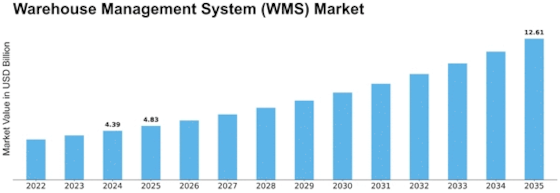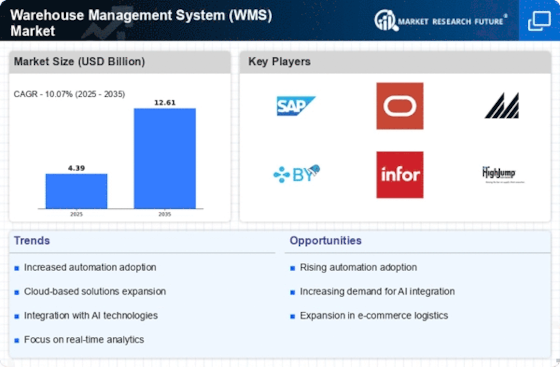-
EXECUTIVE SUMMARY
-
Market Overview
-
Key Findings
-
Market Segmentation
-
Competitive Landscape
-
Challenges and Opportunities
-
Future Outlook
-
MARKET INTRODUCTION
-
Definition
-
Scope of the study
- Research Objective
- Assumption
- Limitations
-
RESEARCH METHODOLOGY
-
Overview
-
Data Mining
-
Secondary Research
-
Primary Research
- Primary Interviews and Information Gathering Process
- Breakdown of Primary Respondents
-
Forecasting Model
-
Market Size Estimation
- Bottom-Up Approach
- Top-Down Approach
-
Data Triangulation
-
Validation
-
MARKET DYNAMICS
-
Overview
-
Drivers
-
Restraints
-
Opportunities
-
MARKET FACTOR ANALYSIS
-
Value chain Analysis
-
Porter's Five Forces Analysis
- Bargaining Power of Suppliers
- Bargaining Power of Buyers
- Threat of New Entrants
- Threat of Substitutes
- Intensity of Rivalry
-
COVID-19 Impact Analysis
- Market Impact Analysis
- Regional Impact
- Opportunity and Threat Analysis
-
Warehouse Management System (WMS) Market, BY Deployment Type (USD Billion)
-
On-Premise
-
Cloud-Based
-
Hybrid
-
Warehouse Management System (WMS) Market, BY Functionality (USD Billion)
-
Inventory Management
-
Order Fulfillment
-
Shipping Management
-
Labor Management
-
Warehouse Management System (WMS) Market, BY End Use Industry (USD Billion)
-
Retail
-
Manufacturing
-
Healthcare
-
Food and Beverage
-
Logistics and Transportation
-
Warehouse Management System (WMS) Market, BY Organization Size (USD Billion)
-
Small Enterprises
-
Medium Enterprises
-
Large Enterprises
-
Warehouse Management System (WMS) Market, BY Regional (USD Billion)
-
North America
- US
- Canada
-
Europe
- Germany
- UK
- France
- Russia
- Italy
- Spain
- Rest of Europe
-
APAC
- China
- India
- Japan
- South Korea
- Malaysia
- Thailand
- Indonesia
- Rest of APAC
-
South America
- Brazil
- Mexico
- Argentina
- Rest of South America
-
MEA
- GCC Countries
- South Africa
- Rest of MEA
-
Competitive Landscape
-
Overview
-
Competitive Analysis
-
Market share Analysis
-
Major Growth Strategy in the Warehouse Management System (WMS) Market
-
Competitive Benchmarking
-
Leading Players in Terms of Number of Developments in the Warehouse Management System (WMS) Market
-
Key developments and growth strategies
- New Product Launch/Service Deployment
- Merger & Acquisitions
- Joint Ventures
-
Major Players Financial Matrix
- Sales and Operating Income
- Major Players R&D Expenditure. 2023
-
Company Profiles
-
Softeon
- Financial Overview
- Products Offered
- Key Developments
- SWOT Analysis
- Key Strategies
-
HighJump
- Financial Overview
- Products Offered
- Key Developments
- SWOT Analysis
- Key Strategies
-
Kinaxis
- Financial Overview
- Products Offered
- Key Developments
- SWOT Analysis
- Key Strategies
-
Swisslog
- Financial Overview
- Products Offered
- Key Developments
- SWOT Analysis
- Key Strategies
-
Oracle
- Financial Overview
- Products Offered
- Key Developments
- SWOT Analysis
- Key Strategies
-
Microsoft
- Financial Overview
- Products Offered
- Key Developments
- SWOT Analysis
- Key Strategies
-
IBM
- Financial Overview
- Products Offered
- Key Developments
- SWOT Analysis
- Key Strategies
-
Infor
- Financial Overview
- Products Offered
- Key Developments
- SWOT Analysis
- Key Strategies
-
Blue Yonder
- Financial Overview
- Products Offered
- Key Developments
- SWOT Analysis
- Key Strategies
-
JDA Software
- Financial Overview
- Products Offered
- Key Developments
- SWOT Analysis
- Key Strategies
-
Manhattan Associates
- Financial Overview
- Products Offered
- Key Developments
- SWOT Analysis
- Key Strategies
-
TECSYS
- Financial Overview
- Products Offered
- Key Developments
- SWOT Analysis
- Key Strategies
-
PSI Logistics
- Financial Overview
- Products Offered
- Key Developments
- SWOT Analysis
- Key Strategies
-
SAP
- Financial Overview
- Products Offered
- Key Developments
- SWOT Analysis
- Key Strategies
-
Appendix
-
References
-
Related Reports
-
LIST Of tables
-
LIST OF ASSUMPTIONS
-
North America Warehouse Management System (WMS) Market SIZE ESTIMATES & FORECAST, BY DEPLOYMENT TYPE, 2019-2035 (USD Billions)
-
North America Warehouse Management System (WMS) Market SIZE ESTIMATES & FORECAST, BY FUNCTIONALITY, 2019-2035 (USD Billions)
-
North America Warehouse Management System (WMS) Market SIZE ESTIMATES & FORECAST, BY END USE INDUSTRY, 2019-2035 (USD Billions)
-
North America Warehouse Management System (WMS) Market SIZE ESTIMATES & FORECAST, BY ORGANIZATION SIZE, 2019-2035 (USD Billions)
-
North America Warehouse Management System (WMS) Market SIZE ESTIMATES & FORECAST, BY REGIONAL, 2019-2035 (USD Billions)
-
US Warehouse Management System (WMS) Market SIZE ESTIMATES & FORECAST, BY DEPLOYMENT TYPE, 2019-2035 (USD Billions)
-
US Warehouse Management System (WMS) Market SIZE ESTIMATES & FORECAST, BY FUNCTIONALITY, 2019-2035 (USD Billions)
-
US Warehouse Management System (WMS) Market SIZE ESTIMATES & FORECAST, BY END USE INDUSTRY, 2019-2035 (USD Billions)
-
US Warehouse Management System (WMS) Market SIZE ESTIMATES & FORECAST, BY ORGANIZATION SIZE, 2019-2035 (USD Billions)
-
US Warehouse Management System (WMS) Market SIZE ESTIMATES & FORECAST, BY REGIONAL, 2019-2035 (USD Billions)
-
Canada Warehouse Management System (WMS) Market SIZE ESTIMATES & FORECAST, BY DEPLOYMENT TYPE, 2019-2035 (USD Billions)
-
Canada Warehouse Management System (WMS) Market SIZE ESTIMATES & FORECAST, BY FUNCTIONALITY, 2019-2035 (USD Billions)
-
Canada Warehouse Management System (WMS) Market SIZE ESTIMATES & FORECAST, BY END USE INDUSTRY, 2019-2035 (USD Billions)
-
Canada Warehouse Management System (WMS) Market SIZE ESTIMATES & FORECAST, BY ORGANIZATION SIZE, 2019-2035 (USD Billions)
-
Canada Warehouse Management System (WMS) Market SIZE ESTIMATES & FORECAST, BY REGIONAL, 2019-2035 (USD Billions)
-
Europe Warehouse Management System (WMS) Market SIZE ESTIMATES & FORECAST, BY DEPLOYMENT TYPE, 2019-2035 (USD Billions)
-
Europe Warehouse Management System (WMS) Market SIZE ESTIMATES & FORECAST, BY FUNCTIONALITY, 2019-2035 (USD Billions)
-
Europe Warehouse Management System (WMS) Market SIZE ESTIMATES & FORECAST, BY END USE INDUSTRY, 2019-2035 (USD Billions)
-
Europe Warehouse Management System (WMS) Market SIZE ESTIMATES & FORECAST, BY ORGANIZATION SIZE, 2019-2035 (USD Billions)
-
Europe Warehouse Management System (WMS) Market SIZE ESTIMATES & FORECAST, BY REGIONAL, 2019-2035 (USD Billions)
-
Germany Warehouse Management System (WMS) Market SIZE ESTIMATES & FORECAST, BY DEPLOYMENT TYPE, 2019-2035 (USD Billions)
-
Germany Warehouse Management System (WMS) Market SIZE ESTIMATES & FORECAST, BY FUNCTIONALITY, 2019-2035 (USD Billions)
-
Germany Warehouse Management System (WMS) Market SIZE ESTIMATES & FORECAST, BY END USE INDUSTRY, 2019-2035 (USD Billions)
-
Germany Warehouse Management System (WMS) Market SIZE ESTIMATES & FORECAST, BY ORGANIZATION SIZE, 2019-2035 (USD Billions)
-
Germany Warehouse Management System (WMS) Market SIZE ESTIMATES & FORECAST, BY REGIONAL, 2019-2035 (USD Billions)
-
UK Warehouse Management System (WMS) Market SIZE ESTIMATES & FORECAST, BY DEPLOYMENT TYPE, 2019-2035 (USD Billions)
-
UK Warehouse Management System (WMS) Market SIZE ESTIMATES & FORECAST, BY FUNCTIONALITY, 2019-2035 (USD Billions)
-
UK Warehouse Management System (WMS) Market SIZE ESTIMATES & FORECAST, BY END USE INDUSTRY, 2019-2035 (USD Billions)
-
UK Warehouse Management System (WMS) Market SIZE ESTIMATES & FORECAST, BY ORGANIZATION SIZE, 2019-2035 (USD Billions)
-
UK Warehouse Management System (WMS) Market SIZE ESTIMATES & FORECAST, BY REGIONAL, 2019-2035 (USD Billions)
-
France Warehouse Management System (WMS) Market SIZE ESTIMATES & FORECAST, BY DEPLOYMENT TYPE, 2019-2035 (USD Billions)
-
France Warehouse Management System (WMS) Market SIZE ESTIMATES & FORECAST, BY FUNCTIONALITY, 2019-2035 (USD Billions)
-
France Warehouse Management System (WMS) Market SIZE ESTIMATES & FORECAST, BY END USE INDUSTRY, 2019-2035 (USD Billions)
-
France Warehouse Management System (WMS) Market SIZE ESTIMATES & FORECAST, BY ORGANIZATION SIZE, 2019-2035 (USD Billions)
-
France Warehouse Management System (WMS) Market SIZE ESTIMATES & FORECAST, BY REGIONAL, 2019-2035 (USD Billions)
-
Russia Warehouse Management System (WMS) Market SIZE ESTIMATES & FORECAST, BY DEPLOYMENT TYPE, 2019-2035 (USD Billions)
-
Russia Warehouse Management System (WMS) Market SIZE ESTIMATES & FORECAST, BY FUNCTIONALITY, 2019-2035 (USD Billions)
-
Russia Warehouse Management System (WMS) Market SIZE ESTIMATES & FORECAST, BY END USE INDUSTRY, 2019-2035 (USD Billions)
-
Russia Warehouse Management System (WMS) Market SIZE ESTIMATES & FORECAST, BY ORGANIZATION SIZE, 2019-2035 (USD Billions)
-
Russia Warehouse Management System (WMS) Market SIZE ESTIMATES & FORECAST, BY REGIONAL, 2019-2035 (USD Billions)
-
Italy Warehouse Management System (WMS) Market SIZE ESTIMATES & FORECAST, BY DEPLOYMENT TYPE, 2019-2035 (USD Billions)
-
Italy Warehouse Management System (WMS) Market SIZE ESTIMATES & FORECAST, BY FUNCTIONALITY, 2019-2035 (USD Billions)
-
Italy Warehouse Management System (WMS) Market SIZE ESTIMATES & FORECAST, BY END USE INDUSTRY, 2019-2035 (USD Billions)
-
Italy Warehouse Management System (WMS) Market SIZE ESTIMATES & FORECAST, BY ORGANIZATION SIZE, 2019-2035 (USD Billions)
-
Italy Warehouse Management System (WMS) Market SIZE ESTIMATES & FORECAST, BY REGIONAL, 2019-2035 (USD Billions)
-
Spain Warehouse Management System (WMS) Market SIZE ESTIMATES & FORECAST, BY DEPLOYMENT TYPE, 2019-2035 (USD Billions)
-
Spain Warehouse Management System (WMS) Market SIZE ESTIMATES & FORECAST, BY FUNCTIONALITY, 2019-2035 (USD Billions)
-
Spain Warehouse Management System (WMS) Market SIZE ESTIMATES & FORECAST, BY END USE INDUSTRY, 2019-2035 (USD Billions)
-
Spain Warehouse Management System (WMS) Market SIZE ESTIMATES & FORECAST, BY ORGANIZATION SIZE, 2019-2035 (USD Billions)
-
Spain Warehouse Management System (WMS) Market SIZE ESTIMATES & FORECAST, BY REGIONAL, 2019-2035 (USD Billions)
-
Rest of Europe Warehouse Management System (WMS) Market SIZE ESTIMATES & FORECAST, BY DEPLOYMENT TYPE, 2019-2035 (USD Billions)
-
Rest of Europe Warehouse Management System (WMS) Market SIZE ESTIMATES & FORECAST, BY FUNCTIONALITY, 2019-2035 (USD Billions)
-
Rest of Europe Warehouse Management System (WMS) Market SIZE ESTIMATES & FORECAST, BY END USE INDUSTRY, 2019-2035 (USD Billions)
-
Rest of Europe Warehouse Management System (WMS) Market SIZE ESTIMATES & FORECAST, BY ORGANIZATION SIZE, 2019-2035 (USD Billions)
-
Rest of Europe Warehouse Management System (WMS) Market SIZE ESTIMATES & FORECAST, BY REGIONAL, 2019-2035 (USD Billions)
-
APAC Warehouse Management System (WMS) Market SIZE ESTIMATES & FORECAST, BY DEPLOYMENT TYPE, 2019-2035 (USD Billions)
-
APAC Warehouse Management System (WMS) Market SIZE ESTIMATES & FORECAST, BY FUNCTIONALITY, 2019-2035 (USD Billions)
-
APAC Warehouse Management System (WMS) Market SIZE ESTIMATES & FORECAST, BY END USE INDUSTRY, 2019-2035 (USD Billions)
-
APAC Warehouse Management System (WMS) Market SIZE ESTIMATES & FORECAST, BY ORGANIZATION SIZE, 2019-2035 (USD Billions)
-
APAC Warehouse Management System (WMS) Market SIZE ESTIMATES & FORECAST, BY REGIONAL, 2019-2035 (USD Billions)
-
China Warehouse Management System (WMS) Market SIZE ESTIMATES & FORECAST, BY DEPLOYMENT TYPE, 2019-2035 (USD Billions)
-
China Warehouse Management System (WMS) Market SIZE ESTIMATES & FORECAST, BY FUNCTIONALITY, 2019-2035 (USD Billions)
-
China Warehouse Management System (WMS) Market SIZE ESTIMATES & FORECAST, BY END USE INDUSTRY, 2019-2035 (USD Billions)
-
China Warehouse Management System (WMS) Market SIZE ESTIMATES & FORECAST, BY ORGANIZATION SIZE, 2019-2035 (USD Billions)
-
China Warehouse Management System (WMS) Market SIZE ESTIMATES & FORECAST, BY REGIONAL, 2019-2035 (USD Billions)
-
India Warehouse Management System (WMS) Market SIZE ESTIMATES & FORECAST, BY DEPLOYMENT TYPE, 2019-2035 (USD Billions)
-
India Warehouse Management System (WMS) Market SIZE ESTIMATES & FORECAST, BY FUNCTIONALITY, 2019-2035 (USD Billions)
-
India Warehouse Management System (WMS) Market SIZE ESTIMATES & FORECAST, BY END USE INDUSTRY, 2019-2035 (USD Billions)
-
India Warehouse Management System (WMS) Market SIZE ESTIMATES & FORECAST, BY ORGANIZATION SIZE, 2019-2035 (USD Billions)
-
India Warehouse Management System (WMS) Market SIZE ESTIMATES & FORECAST, BY REGIONAL, 2019-2035 (USD Billions)
-
Japan Warehouse Management System (WMS) Market SIZE ESTIMATES & FORECAST, BY DEPLOYMENT TYPE, 2019-2035 (USD Billions)
-
Japan Warehouse Management System (WMS) Market SIZE ESTIMATES & FORECAST, BY FUNCTIONALITY, 2019-2035 (USD Billions)
-
Japan Warehouse Management System (WMS) Market SIZE ESTIMATES & FORECAST, BY END USE INDUSTRY, 2019-2035 (USD Billions)
-
Japan Warehouse Management System (WMS) Market SIZE ESTIMATES & FORECAST, BY ORGANIZATION SIZE, 2019-2035 (USD Billions)
-
Japan Warehouse Management System (WMS) Market SIZE ESTIMATES & FORECAST, BY REGIONAL, 2019-2035 (USD Billions)
-
South Korea Warehouse Management System (WMS) Market SIZE ESTIMATES & FORECAST, BY DEPLOYMENT TYPE, 2019-2035 (USD Billions)
-
South Korea Warehouse Management System (WMS) Market SIZE ESTIMATES & FORECAST, BY FUNCTIONALITY, 2019-2035 (USD Billions)
-
South Korea Warehouse Management System (WMS) Market SIZE ESTIMATES & FORECAST, BY END USE INDUSTRY, 2019-2035 (USD Billions)
-
South Korea Warehouse Management System (WMS) Market SIZE ESTIMATES & FORECAST, BY ORGANIZATION SIZE, 2019-2035 (USD Billions)
-
South Korea Warehouse Management System (WMS) Market SIZE ESTIMATES & FORECAST, BY REGIONAL, 2019-2035 (USD Billions)
-
Malaysia Warehouse Management System (WMS) Market SIZE ESTIMATES & FORECAST, BY DEPLOYMENT TYPE, 2019-2035 (USD Billions)
-
Malaysia Warehouse Management System (WMS) Market SIZE ESTIMATES & FORECAST, BY FUNCTIONALITY, 2019-2035 (USD Billions)
-
Malaysia Warehouse Management System (WMS) Market SIZE ESTIMATES & FORECAST, BY END USE INDUSTRY, 2019-2035 (USD Billions)
-
Malaysia Warehouse Management System (WMS) Market SIZE ESTIMATES & FORECAST, BY ORGANIZATION SIZE, 2019-2035 (USD Billions)
-
Malaysia Warehouse Management System (WMS) Market SIZE ESTIMATES & FORECAST, BY REGIONAL, 2019-2035 (USD Billions)
-
Thailand Warehouse Management System (WMS) Market SIZE ESTIMATES & FORECAST, BY DEPLOYMENT TYPE, 2019-2035 (USD Billions)
-
Thailand Warehouse Management System (WMS) Market SIZE ESTIMATES & FORECAST, BY FUNCTIONALITY, 2019-2035 (USD Billions)
-
Thailand Warehouse Management System (WMS) Market SIZE ESTIMATES & FORECAST, BY END USE INDUSTRY, 2019-2035 (USD Billions)
-
Thailand Warehouse Management System (WMS) Market SIZE ESTIMATES & FORECAST, BY ORGANIZATION SIZE, 2019-2035 (USD Billions)
-
Thailand Warehouse Management System (WMS) Market SIZE ESTIMATES & FORECAST, BY REGIONAL, 2019-2035 (USD Billions)
-
Indonesia Warehouse Management System (WMS) Market SIZE ESTIMATES & FORECAST, BY DEPLOYMENT TYPE, 2019-2035 (USD Billions)
-
Indonesia Warehouse Management System (WMS) Market SIZE ESTIMATES & FORECAST, BY FUNCTIONALITY, 2019-2035 (USD Billions)
-
Indonesia Warehouse Management System (WMS) Market SIZE ESTIMATES & FORECAST, BY END USE INDUSTRY, 2019-2035 (USD Billions)
-
Indonesia Warehouse Management System (WMS) Market SIZE ESTIMATES & FORECAST, BY ORGANIZATION SIZE, 2019-2035 (USD Billions)
-
Indonesia Warehouse Management System (WMS) Market SIZE ESTIMATES & FORECAST, BY REGIONAL, 2019-2035 (USD Billions)
-
Rest of APAC Warehouse Management System (WMS) Market SIZE ESTIMATES & FORECAST, BY DEPLOYMENT TYPE, 2019-2035 (USD Billions)
-
Rest of APAC Warehouse Management System (WMS) Market SIZE ESTIMATES & FORECAST, BY FUNCTIONALITY, 2019-2035 (USD Billions)
-
Rest of APAC Warehouse Management System (WMS) Market SIZE ESTIMATES & FORECAST, BY END USE INDUSTRY, 2019-2035 (USD Billions)
-
Rest of APAC Warehouse Management System (WMS) Market SIZE ESTIMATES & FORECAST, BY ORGANIZATION SIZE, 2019-2035 (USD Billions)
-
Rest of APAC Warehouse Management System (WMS) Market SIZE ESTIMATES & FORECAST, BY REGIONAL, 2019-2035 (USD Billions)
-
South America Warehouse Management System (WMS) Market SIZE ESTIMATES & FORECAST, BY DEPLOYMENT TYPE, 2019-2035 (USD Billions)
-
South America Warehouse Management System (WMS) Market SIZE ESTIMATES & FORECAST, BY FUNCTIONALITY, 2019-2035 (USD Billions)
-
South America Warehouse Management System (WMS) Market SIZE ESTIMATES & FORECAST, BY END USE INDUSTRY, 2019-2035 (USD Billions)
-
South America Warehouse Management System (WMS) Market SIZE ESTIMATES & FORECAST, BY ORGANIZATION SIZE, 2019-2035 (USD Billions)
-
South America Warehouse Management System (WMS) Market SIZE ESTIMATES & FORECAST, BY REGIONAL, 2019-2035 (USD Billions)
-
Brazil Warehouse Management System (WMS) Market SIZE ESTIMATES & FORECAST, BY DEPLOYMENT TYPE, 2019-2035 (USD Billions)
-
Brazil Warehouse Management System (WMS) Market SIZE ESTIMATES & FORECAST, BY FUNCTIONALITY, 2019-2035 (USD Billions)
-
Brazil Warehouse Management System (WMS) Market SIZE ESTIMATES & FORECAST, BY END USE INDUSTRY, 2019-2035 (USD Billions)
-
Brazil Warehouse Management System (WMS) Market SIZE ESTIMATES & FORECAST, BY ORGANIZATION SIZE, 2019-2035 (USD Billions)
-
Brazil Warehouse Management System (WMS) Market SIZE ESTIMATES & FORECAST, BY REGIONAL, 2019-2035 (USD Billions)
-
Mexico Warehouse Management System (WMS) Market SIZE ESTIMATES & FORECAST, BY DEPLOYMENT TYPE, 2019-2035 (USD Billions)
-
Mexico Warehouse Management System (WMS) Market SIZE ESTIMATES & FORECAST, BY FUNCTIONALITY, 2019-2035 (USD Billions)
-
Mexico Warehouse Management System (WMS) Market SIZE ESTIMATES & FORECAST, BY END USE INDUSTRY, 2019-2035 (USD Billions)
-
Mexico Warehouse Management System (WMS) Market SIZE ESTIMATES & FORECAST, BY ORGANIZATION SIZE, 2019-2035 (USD Billions)
-
Mexico Warehouse Management System (WMS) Market SIZE ESTIMATES & FORECAST, BY REGIONAL, 2019-2035 (USD Billions)
-
Argentina Warehouse Management System (WMS) Market SIZE ESTIMATES & FORECAST, BY DEPLOYMENT TYPE, 2019-2035 (USD Billions)
-
Argentina Warehouse Management System (WMS) Market SIZE ESTIMATES & FORECAST, BY FUNCTIONALITY, 2019-2035 (USD Billions)
-
Argentina Warehouse Management System (WMS) Market SIZE ESTIMATES & FORECAST, BY END USE INDUSTRY, 2019-2035 (USD Billions)
-
Argentina Warehouse Management System (WMS) Market SIZE ESTIMATES & FORECAST, BY ORGANIZATION SIZE, 2019-2035 (USD Billions)
-
Argentina Warehouse Management System (WMS) Market SIZE ESTIMATES & FORECAST, BY REGIONAL, 2019-2035 (USD Billions)
-
Rest of South America Warehouse Management System (WMS) Market SIZE ESTIMATES & FORECAST, BY DEPLOYMENT TYPE, 2019-2035 (USD Billions)
-
Rest of South America Warehouse Management System (WMS) Market SIZE ESTIMATES & FORECAST, BY FUNCTIONALITY, 2019-2035 (USD Billions)
-
Rest of South America Warehouse Management System (WMS) Market SIZE ESTIMATES & FORECAST, BY END USE INDUSTRY, 2019-2035 (USD Billions)
-
Rest of South America Warehouse Management System (WMS) Market SIZE ESTIMATES & FORECAST, BY ORGANIZATION SIZE, 2019-2035 (USD Billions)
-
Rest of South America Warehouse Management System (WMS) Market SIZE ESTIMATES & FORECAST, BY REGIONAL, 2019-2035 (USD Billions)
-
MEA Warehouse Management System (WMS) Market SIZE ESTIMATES & FORECAST, BY DEPLOYMENT TYPE, 2019-2035 (USD Billions)
-
MEA Warehouse Management System (WMS) Market SIZE ESTIMATES & FORECAST, BY FUNCTIONALITY, 2019-2035 (USD Billions)
-
MEA Warehouse Management System (WMS) Market SIZE ESTIMATES & FORECAST, BY END USE INDUSTRY, 2019-2035 (USD Billions)
-
MEA Warehouse Management System (WMS) Market SIZE ESTIMATES & FORECAST, BY ORGANIZATION SIZE, 2019-2035 (USD Billions)
-
MEA Warehouse Management System (WMS) Market SIZE ESTIMATES & FORECAST, BY REGIONAL, 2019-2035 (USD Billions)
-
GCC Countries Warehouse Management System (WMS) Market SIZE ESTIMATES & FORECAST, BY DEPLOYMENT TYPE, 2019-2035 (USD Billions)
-
GCC Countries Warehouse Management System (WMS) Market SIZE ESTIMATES & FORECAST, BY FUNCTIONALITY, 2019-2035 (USD Billions)
-
GCC Countries Warehouse Management System (WMS) Market SIZE ESTIMATES & FORECAST, BY END USE INDUSTRY, 2019-2035 (USD Billions)
-
GCC Countries Warehouse Management System (WMS) Market SIZE ESTIMATES & FORECAST, BY ORGANIZATION SIZE, 2019-2035 (USD Billions)
-
GCC Countries Warehouse Management System (WMS) Market SIZE ESTIMATES & FORECAST, BY REGIONAL, 2019-2035 (USD Billions)
-
South Africa Warehouse Management System (WMS) Market SIZE ESTIMATES & FORECAST, BY DEPLOYMENT TYPE, 2019-2035 (USD Billions)
-
South Africa Warehouse Management System (WMS) Market SIZE ESTIMATES & FORECAST, BY FUNCTIONALITY, 2019-2035 (USD Billions)
-
South Africa Warehouse Management System (WMS) Market SIZE ESTIMATES & FORECAST, BY END USE INDUSTRY, 2019-2035 (USD Billions)
-
South Africa Warehouse Management System (WMS) Market SIZE ESTIMATES & FORECAST, BY ORGANIZATION SIZE, 2019-2035 (USD Billions)
-
South Africa Warehouse Management System (WMS) Market SIZE ESTIMATES & FORECAST, BY REGIONAL, 2019-2035 (USD Billions)
-
Rest of MEA Warehouse Management System (WMS) Market SIZE ESTIMATES & FORECAST, BY DEPLOYMENT TYPE, 2019-2035 (USD Billions)
-
Rest of MEA Warehouse Management System (WMS) Market SIZE ESTIMATES & FORECAST, BY FUNCTIONALITY, 2019-2035 (USD Billions)
-
Rest of MEA Warehouse Management System (WMS) Market SIZE ESTIMATES & FORECAST, BY END USE INDUSTRY, 2019-2035 (USD Billions)
-
Rest of MEA Warehouse Management System (WMS) Market SIZE ESTIMATES & FORECAST, BY ORGANIZATION SIZE, 2019-2035 (USD Billions)
-
Rest of MEA Warehouse Management System (WMS) Market SIZE ESTIMATES & FORECAST, BY REGIONAL, 2019-2035 (USD Billions)
-
PRODUCT LAUNCH/PRODUCT DEVELOPMENT/APPROVAL
-
ACQUISITION/PARTNERSHIP
-
LIST Of figures
-
MARKET SYNOPSIS
-
NORTH AMERICA WAREHOUSE MANAGEMENT SYSTEM (WMS) MARKET ANALYSIS
-
US WAREHOUSE MANAGEMENT SYSTEM (WMS) MARKET ANALYSIS BY DEPLOYMENT TYPE
-
US WAREHOUSE MANAGEMENT SYSTEM (WMS) MARKET ANALYSIS BY FUNCTIONALITY
-
US WAREHOUSE MANAGEMENT SYSTEM (WMS) MARKET ANALYSIS BY END USE INDUSTRY
-
US WAREHOUSE MANAGEMENT SYSTEM (WMS) MARKET ANALYSIS BY ORGANIZATION SIZE
-
US WAREHOUSE MANAGEMENT SYSTEM (WMS) MARKET ANALYSIS BY REGIONAL
-
CANADA WAREHOUSE MANAGEMENT SYSTEM (WMS) MARKET ANALYSIS BY DEPLOYMENT TYPE
-
CANADA WAREHOUSE MANAGEMENT SYSTEM (WMS) MARKET ANALYSIS BY FUNCTIONALITY
-
CANADA WAREHOUSE MANAGEMENT SYSTEM (WMS) MARKET ANALYSIS BY END USE INDUSTRY
-
CANADA WAREHOUSE MANAGEMENT SYSTEM (WMS) MARKET ANALYSIS BY ORGANIZATION SIZE
-
CANADA WAREHOUSE MANAGEMENT SYSTEM (WMS) MARKET ANALYSIS BY REGIONAL
-
EUROPE WAREHOUSE MANAGEMENT SYSTEM (WMS) MARKET ANALYSIS
-
GERMANY WAREHOUSE MANAGEMENT SYSTEM (WMS) MARKET ANALYSIS BY DEPLOYMENT TYPE
-
GERMANY WAREHOUSE MANAGEMENT SYSTEM (WMS) MARKET ANALYSIS BY FUNCTIONALITY
-
GERMANY WAREHOUSE MANAGEMENT SYSTEM (WMS) MARKET ANALYSIS BY END USE INDUSTRY
-
GERMANY WAREHOUSE MANAGEMENT SYSTEM (WMS) MARKET ANALYSIS BY ORGANIZATION SIZE
-
GERMANY WAREHOUSE MANAGEMENT SYSTEM (WMS) MARKET ANALYSIS BY REGIONAL
-
UK WAREHOUSE MANAGEMENT SYSTEM (WMS) MARKET ANALYSIS BY DEPLOYMENT TYPE
-
UK WAREHOUSE MANAGEMENT SYSTEM (WMS) MARKET ANALYSIS BY FUNCTIONALITY
-
UK WAREHOUSE MANAGEMENT SYSTEM (WMS) MARKET ANALYSIS BY END USE INDUSTRY
-
UK WAREHOUSE MANAGEMENT SYSTEM (WMS) MARKET ANALYSIS BY ORGANIZATION SIZE
-
UK WAREHOUSE MANAGEMENT SYSTEM (WMS) MARKET ANALYSIS BY REGIONAL
-
FRANCE WAREHOUSE MANAGEMENT SYSTEM (WMS) MARKET ANALYSIS BY DEPLOYMENT TYPE
-
FRANCE WAREHOUSE MANAGEMENT SYSTEM (WMS) MARKET ANALYSIS BY FUNCTIONALITY
-
FRANCE WAREHOUSE MANAGEMENT SYSTEM (WMS) MARKET ANALYSIS BY END USE INDUSTRY
-
FRANCE WAREHOUSE MANAGEMENT SYSTEM (WMS) MARKET ANALYSIS BY ORGANIZATION SIZE
-
FRANCE WAREHOUSE MANAGEMENT SYSTEM (WMS) MARKET ANALYSIS BY REGIONAL
-
RUSSIA WAREHOUSE MANAGEMENT SYSTEM (WMS) MARKET ANALYSIS BY DEPLOYMENT TYPE
-
RUSSIA WAREHOUSE MANAGEMENT SYSTEM (WMS) MARKET ANALYSIS BY FUNCTIONALITY
-
RUSSIA WAREHOUSE MANAGEMENT SYSTEM (WMS) MARKET ANALYSIS BY END USE INDUSTRY
-
RUSSIA WAREHOUSE MANAGEMENT SYSTEM (WMS) MARKET ANALYSIS BY ORGANIZATION SIZE
-
RUSSIA WAREHOUSE MANAGEMENT SYSTEM (WMS) MARKET ANALYSIS BY REGIONAL
-
ITALY WAREHOUSE MANAGEMENT SYSTEM (WMS) MARKET ANALYSIS BY DEPLOYMENT TYPE
-
ITALY WAREHOUSE MANAGEMENT SYSTEM (WMS) MARKET ANALYSIS BY FUNCTIONALITY
-
ITALY WAREHOUSE MANAGEMENT SYSTEM (WMS) MARKET ANALYSIS BY END USE INDUSTRY
-
ITALY WAREHOUSE MANAGEMENT SYSTEM (WMS) MARKET ANALYSIS BY ORGANIZATION SIZE
-
ITALY WAREHOUSE MANAGEMENT SYSTEM (WMS) MARKET ANALYSIS BY REGIONAL
-
SPAIN WAREHOUSE MANAGEMENT SYSTEM (WMS) MARKET ANALYSIS BY DEPLOYMENT TYPE
-
SPAIN WAREHOUSE MANAGEMENT SYSTEM (WMS) MARKET ANALYSIS BY FUNCTIONALITY
-
SPAIN WAREHOUSE MANAGEMENT SYSTEM (WMS) MARKET ANALYSIS BY END USE INDUSTRY
-
SPAIN WAREHOUSE MANAGEMENT SYSTEM (WMS) MARKET ANALYSIS BY ORGANIZATION SIZE
-
SPAIN WAREHOUSE MANAGEMENT SYSTEM (WMS) MARKET ANALYSIS BY REGIONAL
-
REST OF EUROPE WAREHOUSE MANAGEMENT SYSTEM (WMS) MARKET ANALYSIS BY DEPLOYMENT TYPE
-
REST OF EUROPE WAREHOUSE MANAGEMENT SYSTEM (WMS) MARKET ANALYSIS BY FUNCTIONALITY
-
REST OF EUROPE WAREHOUSE MANAGEMENT SYSTEM (WMS) MARKET ANALYSIS BY END USE INDUSTRY
-
REST OF EUROPE WAREHOUSE MANAGEMENT SYSTEM (WMS) MARKET ANALYSIS BY ORGANIZATION SIZE
-
REST OF EUROPE WAREHOUSE MANAGEMENT SYSTEM (WMS) MARKET ANALYSIS BY REGIONAL
-
APAC WAREHOUSE MANAGEMENT SYSTEM (WMS) MARKET ANALYSIS
-
CHINA WAREHOUSE MANAGEMENT SYSTEM (WMS) MARKET ANALYSIS BY DEPLOYMENT TYPE
-
CHINA WAREHOUSE MANAGEMENT SYSTEM (WMS) MARKET ANALYSIS BY FUNCTIONALITY
-
CHINA WAREHOUSE MANAGEMENT SYSTEM (WMS) MARKET ANALYSIS BY END USE INDUSTRY
-
CHINA WAREHOUSE MANAGEMENT SYSTEM (WMS) MARKET ANALYSIS BY ORGANIZATION SIZE
-
CHINA WAREHOUSE MANAGEMENT SYSTEM (WMS) MARKET ANALYSIS BY REGIONAL
-
INDIA WAREHOUSE MANAGEMENT SYSTEM (WMS) MARKET ANALYSIS BY DEPLOYMENT TYPE
-
INDIA WAREHOUSE MANAGEMENT SYSTEM (WMS) MARKET ANALYSIS BY FUNCTIONALITY
-
INDIA WAREHOUSE MANAGEMENT SYSTEM (WMS) MARKET ANALYSIS BY END USE INDUSTRY
-
INDIA WAREHOUSE MANAGEMENT SYSTEM (WMS) MARKET ANALYSIS BY ORGANIZATION SIZE
-
INDIA WAREHOUSE MANAGEMENT SYSTEM (WMS) MARKET ANALYSIS BY REGIONAL
-
JAPAN WAREHOUSE MANAGEMENT SYSTEM (WMS) MARKET ANALYSIS BY DEPLOYMENT TYPE
-
JAPAN WAREHOUSE MANAGEMENT SYSTEM (WMS) MARKET ANALYSIS BY FUNCTIONALITY
-
JAPAN WAREHOUSE MANAGEMENT SYSTEM (WMS) MARKET ANALYSIS BY END USE INDUSTRY
-
JAPAN WAREHOUSE MANAGEMENT SYSTEM (WMS) MARKET ANALYSIS BY ORGANIZATION SIZE
-
JAPAN WAREHOUSE MANAGEMENT SYSTEM (WMS) MARKET ANALYSIS BY REGIONAL
-
SOUTH KOREA WAREHOUSE MANAGEMENT SYSTEM (WMS) MARKET ANALYSIS BY DEPLOYMENT TYPE
-
SOUTH KOREA WAREHOUSE MANAGEMENT SYSTEM (WMS) MARKET ANALYSIS BY FUNCTIONALITY
-
SOUTH KOREA WAREHOUSE MANAGEMENT SYSTEM (WMS) MARKET ANALYSIS BY END USE INDUSTRY
-
SOUTH KOREA WAREHOUSE MANAGEMENT SYSTEM (WMS) MARKET ANALYSIS BY ORGANIZATION SIZE
-
SOUTH KOREA WAREHOUSE MANAGEMENT SYSTEM (WMS) MARKET ANALYSIS BY REGIONAL
-
MALAYSIA WAREHOUSE MANAGEMENT SYSTEM (WMS) MARKET ANALYSIS BY DEPLOYMENT TYPE
-
MALAYSIA WAREHOUSE MANAGEMENT SYSTEM (WMS) MARKET ANALYSIS BY FUNCTIONALITY
-
MALAYSIA WAREHOUSE MANAGEMENT SYSTEM (WMS) MARKET ANALYSIS BY END USE INDUSTRY
-
MALAYSIA WAREHOUSE MANAGEMENT SYSTEM (WMS) MARKET ANALYSIS BY ORGANIZATION SIZE
-
MALAYSIA WAREHOUSE MANAGEMENT SYSTEM (WMS) MARKET ANALYSIS BY REGIONAL
-
THAILAND WAREHOUSE MANAGEMENT SYSTEM (WMS) MARKET ANALYSIS BY DEPLOYMENT TYPE
-
THAILAND WAREHOUSE MANAGEMENT SYSTEM (WMS) MARKET ANALYSIS BY FUNCTIONALITY
-
THAILAND WAREHOUSE MANAGEMENT SYSTEM (WMS) MARKET ANALYSIS BY END USE INDUSTRY
-
THAILAND WAREHOUSE MANAGEMENT SYSTEM (WMS) MARKET ANALYSIS BY ORGANIZATION SIZE
-
THAILAND WAREHOUSE MANAGEMENT SYSTEM (WMS) MARKET ANALYSIS BY REGIONAL
-
INDONESIA WAREHOUSE MANAGEMENT SYSTEM (WMS) MARKET ANALYSIS BY DEPLOYMENT TYPE
-
INDONESIA WAREHOUSE MANAGEMENT SYSTEM (WMS) MARKET ANALYSIS BY FUNCTIONALITY
-
INDONESIA WAREHOUSE MANAGEMENT SYSTEM (WMS) MARKET ANALYSIS BY END USE INDUSTRY
-
INDONESIA WAREHOUSE MANAGEMENT SYSTEM (WMS) MARKET ANALYSIS BY ORGANIZATION SIZE
-
INDONESIA WAREHOUSE MANAGEMENT SYSTEM (WMS) MARKET ANALYSIS BY REGIONAL
-
REST OF APAC WAREHOUSE MANAGEMENT SYSTEM (WMS) MARKET ANALYSIS BY DEPLOYMENT TYPE
-
REST OF APAC WAREHOUSE MANAGEMENT SYSTEM (WMS) MARKET ANALYSIS BY FUNCTIONALITY
-
REST OF APAC WAREHOUSE MANAGEMENT SYSTEM (WMS) MARKET ANALYSIS BY END USE INDUSTRY
-
REST OF APAC WAREHOUSE MANAGEMENT SYSTEM (WMS) MARKET ANALYSIS BY ORGANIZATION SIZE
-
REST OF APAC WAREHOUSE MANAGEMENT SYSTEM (WMS) MARKET ANALYSIS BY REGIONAL
-
SOUTH AMERICA WAREHOUSE MANAGEMENT SYSTEM (WMS) MARKET ANALYSIS
-
BRAZIL WAREHOUSE MANAGEMENT SYSTEM (WMS) MARKET ANALYSIS BY DEPLOYMENT TYPE
-
BRAZIL WAREHOUSE MANAGEMENT SYSTEM (WMS) MARKET ANALYSIS BY FUNCTIONALITY
-
BRAZIL WAREHOUSE MANAGEMENT SYSTEM (WMS) MARKET ANALYSIS BY END USE INDUSTRY
-
BRAZIL WAREHOUSE MANAGEMENT SYSTEM (WMS) MARKET ANALYSIS BY ORGANIZATION SIZE
-
BRAZIL WAREHOUSE MANAGEMENT SYSTEM (WMS) MARKET ANALYSIS BY REGIONAL
-
MEXICO WAREHOUSE MANAGEMENT SYSTEM (WMS) MARKET ANALYSIS BY DEPLOYMENT TYPE
-
MEXICO WAREHOUSE MANAGEMENT SYSTEM (WMS) MARKET ANALYSIS BY FUNCTIONALITY
-
MEXICO WAREHOUSE MANAGEMENT SYSTEM (WMS) MARKET ANALYSIS BY END USE INDUSTRY
-
MEXICO WAREHOUSE MANAGEMENT SYSTEM (WMS) MARKET ANALYSIS BY ORGANIZATION SIZE
-
MEXICO WAREHOUSE MANAGEMENT SYSTEM (WMS) MARKET ANALYSIS BY REGIONAL
-
ARGENTINA WAREHOUSE MANAGEMENT SYSTEM (WMS) MARKET ANALYSIS BY DEPLOYMENT TYPE
-
ARGENTINA WAREHOUSE MANAGEMENT SYSTEM (WMS) MARKET ANALYSIS BY FUNCTIONALITY
-
ARGENTINA WAREHOUSE MANAGEMENT SYSTEM (WMS) MARKET ANALYSIS BY END USE INDUSTRY
-
ARGENTINA WAREHOUSE MANAGEMENT SYSTEM (WMS) MARKET ANALYSIS BY ORGANIZATION SIZE
-
ARGENTINA WAREHOUSE MANAGEMENT SYSTEM (WMS) MARKET ANALYSIS BY REGIONAL
-
REST OF SOUTH AMERICA WAREHOUSE MANAGEMENT SYSTEM (WMS) MARKET ANALYSIS BY DEPLOYMENT TYPE
-
REST OF SOUTH AMERICA WAREHOUSE MANAGEMENT SYSTEM (WMS) MARKET ANALYSIS BY FUNCTIONALITY
-
REST OF SOUTH AMERICA WAREHOUSE MANAGEMENT SYSTEM (WMS) MARKET ANALYSIS BY END USE INDUSTRY
-
REST OF SOUTH AMERICA WAREHOUSE MANAGEMENT SYSTEM (WMS) MARKET ANALYSIS BY ORGANIZATION SIZE
-
REST OF SOUTH AMERICA WAREHOUSE MANAGEMENT SYSTEM (WMS) MARKET ANALYSIS BY REGIONAL
-
MEA WAREHOUSE MANAGEMENT SYSTEM (WMS) MARKET ANALYSIS
-
GCC COUNTRIES WAREHOUSE MANAGEMENT SYSTEM (WMS) MARKET ANALYSIS BY DEPLOYMENT TYPE
-
GCC COUNTRIES WAREHOUSE MANAGEMENT SYSTEM (WMS) MARKET ANALYSIS BY FUNCTIONALITY
-
GCC COUNTRIES WAREHOUSE MANAGEMENT SYSTEM (WMS) MARKET ANALYSIS BY END USE INDUSTRY
-
GCC COUNTRIES WAREHOUSE MANAGEMENT SYSTEM (WMS) MARKET ANALYSIS BY ORGANIZATION SIZE
-
GCC COUNTRIES WAREHOUSE MANAGEMENT SYSTEM (WMS) MARKET ANALYSIS BY REGIONAL
-
SOUTH AFRICA WAREHOUSE MANAGEMENT SYSTEM (WMS) MARKET ANALYSIS BY DEPLOYMENT TYPE
-
SOUTH AFRICA WAREHOUSE MANAGEMENT SYSTEM (WMS) MARKET ANALYSIS BY FUNCTIONALITY
-
SOUTH AFRICA WAREHOUSE MANAGEMENT SYSTEM (WMS) MARKET ANALYSIS BY END USE INDUSTRY
-
SOUTH AFRICA WAREHOUSE MANAGEMENT SYSTEM (WMS) MARKET ANALYSIS BY ORGANIZATION SIZE
-
SOUTH AFRICA WAREHOUSE MANAGEMENT SYSTEM (WMS) MARKET ANALYSIS BY REGIONAL
-
REST OF MEA WAREHOUSE MANAGEMENT SYSTEM (WMS) MARKET ANALYSIS BY DEPLOYMENT TYPE
-
REST OF MEA WAREHOUSE MANAGEMENT SYSTEM (WMS) MARKET ANALYSIS BY FUNCTIONALITY
-
REST OF MEA WAREHOUSE MANAGEMENT SYSTEM (WMS) MARKET ANALYSIS BY END USE INDUSTRY
-
REST OF MEA WAREHOUSE MANAGEMENT SYSTEM (WMS) MARKET ANALYSIS BY ORGANIZATION SIZE
-
REST OF MEA WAREHOUSE MANAGEMENT SYSTEM (WMS) MARKET ANALYSIS BY REGIONAL
-
KEY BUYING CRITERIA OF WAREHOUSE MANAGEMENT SYSTEM (WMS) MARKET
-
RESEARCH PROCESS OF MRFR
-
DRO ANALYSIS OF WAREHOUSE MANAGEMENT SYSTEM (WMS) MARKET
-
DRIVERS IMPACT ANALYSIS: WAREHOUSE MANAGEMENT SYSTEM (WMS) MARKET
-
RESTRAINTS IMPACT ANALYSIS: WAREHOUSE MANAGEMENT SYSTEM (WMS) MARKET
-
SUPPLY / VALUE CHAIN: WAREHOUSE MANAGEMENT SYSTEM (WMS) MARKET
-
WAREHOUSE MANAGEMENT SYSTEM (WMS) MARKET, BY DEPLOYMENT TYPE, 2025 (% SHARE)
-
WAREHOUSE MANAGEMENT SYSTEM (WMS) MARKET, BY DEPLOYMENT TYPE, 2019 TO 2035 (USD Billions)
-
WAREHOUSE MANAGEMENT SYSTEM (WMS) MARKET, BY FUNCTIONALITY, 2025 (% SHARE)
-
WAREHOUSE MANAGEMENT SYSTEM (WMS) MARKET, BY FUNCTIONALITY, 2019 TO 2035 (USD Billions)
-
WAREHOUSE MANAGEMENT SYSTEM (WMS) MARKET, BY END USE INDUSTRY, 2025 (% SHARE)
-
WAREHOUSE MANAGEMENT SYSTEM (WMS) MARKET, BY END USE INDUSTRY, 2019 TO 2035 (USD Billions)
-
WAREHOUSE MANAGEMENT SYSTEM (WMS) MARKET, BY ORGANIZATION SIZE, 2025 (% SHARE)
-
WAREHOUSE MANAGEMENT SYSTEM (WMS) MARKET, BY ORGANIZATION SIZE, 2019 TO 2035 (USD Billions)
-
WAREHOUSE MANAGEMENT SYSTEM (WMS) MARKET, BY REGIONAL, 2025 (% SHARE)
-
WAREHOUSE MANAGEMENT SYSTEM (WMS) MARKET, BY REGIONAL, 2019 TO 2035 (USD Billions)
-
BENCHMARKING OF MAJOR COMPETITORS



















Leave a Comment